Casetext is launching an AI driven drafting tool called Compose. Compose does not promise to replace lawyers – it
offers to make lawyers more efficient by automating the first draft of a motion or brief. It can also function as a tutorial for a new lawyer who is assigned with drafting a motion for the first time. Casetext is currently working with a group of law firm “partners” who will help them develop an expanded library of motions. According to Pablo Arredondo, Co-Founder and Chief Product Officer they hope to have 50 motions available by the end of the year.
The press release positions Compose as being “poised to disrupt the $437-billion legal services industry and fundamentally change our understanding of what types of professional work are uniquely human.” Caetext is certainly the first company I know of to successfully automate the drafting of substantive documents such as motions and briefs. Several years ago Ross was rumored to be building a brief drafting tool LegalMation has automated the production of responsive pleadings in specific practice areas. Compose is a major breakthrough in using AI for more complex work: researching and drafting motions.
In a recent presentation showing Compose, Casetext’s CEO and co-founder Jake Heller focused how Compose can help lawyers by freeing them to focus on high level analysis. Automation will eliminate the drudge work and free lawyers to focus on higher level work. “After automation, what’s left are the most interesting, substantive, strategic parts of legal practice, without the drudgery, the expense, and the inefficiency,We’re making space for lawyers to make new arguments, pursue new strategies, and experiment with new business models. But what’s maybe most exciting about this, and any truly innovative technology, is that we don’t know exactly what the impacts will be. Automation allows for imagination.”
Compose And Real ROI
There is no doubt that partners worry about associates research abilities and clients object to being charged for the time of few associates who are “learning on the job.” Compose promises to dramatically reduce the drafting time for a motion which according to the press release “often takes 10-80 hours of billable work: searching case law databases, consulting treatises, digging through brief banks, etc. Compose enables an attorney to construct a compelling, well-supported legal argument in 20 minutes.” Although not highlighted in the press release – I see Compose as offering a powerful tutorial component, by guiding a lawyer through the issues they need to consider based on the specific facts of their motion.
The Compose process is remarkably straight forward. After selecting the motion type, a lawyer indicates whether they are representing the plaintiff or defendant. They select the jurisdiction and then the lawyer selectes the issues to be addressed in the motion based on the facts and the motion is built through a series of clicks where the lawyers selects the best arguments supported by precedent..
Motion Setup
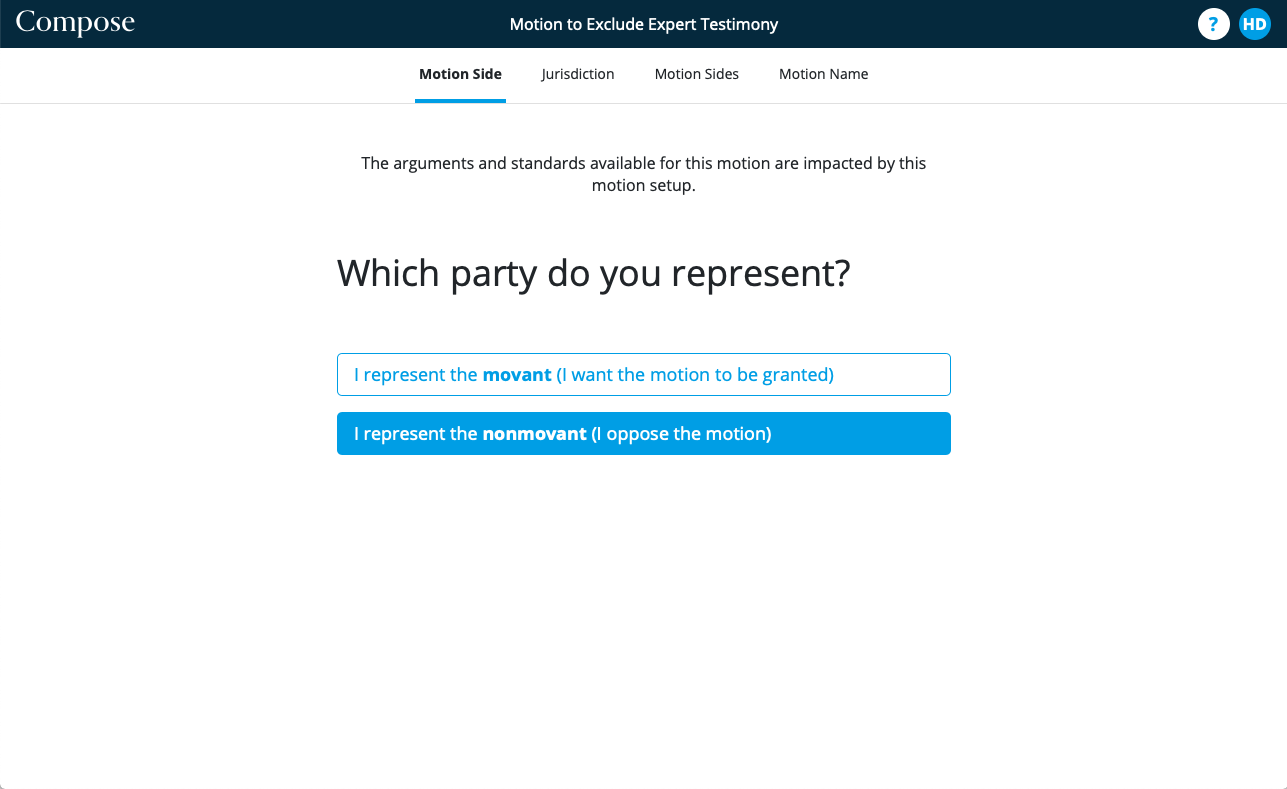
Outline of Issues
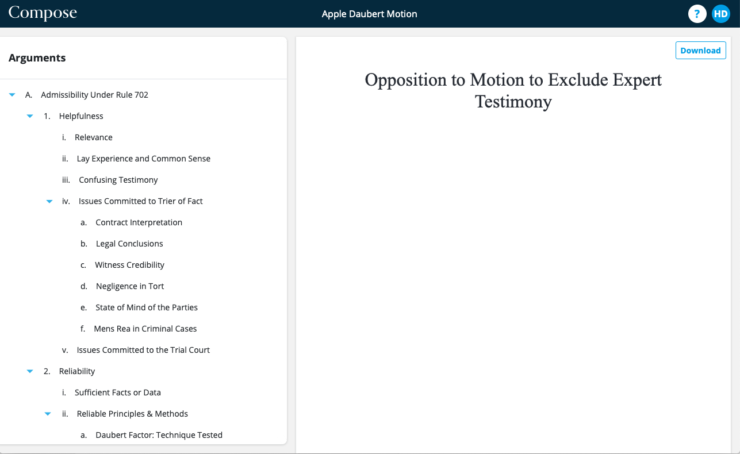
Insert Text Into Document
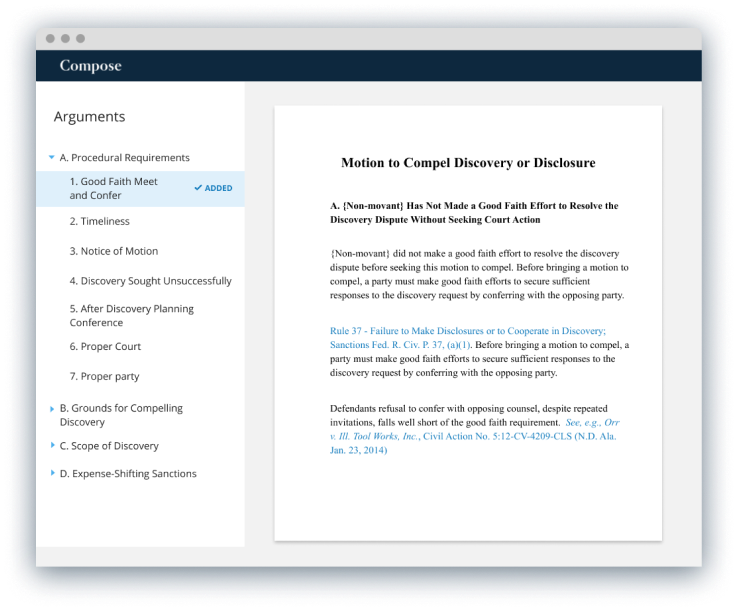
Explore Standards and Insert Text
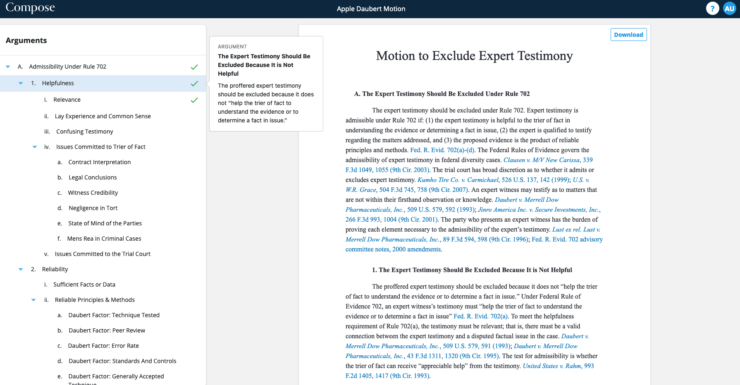
Parallel Search — Ending the Tyranny of the Keyword For those of use who were introduced to case law research using indices and nested hierarchies – online research was a great leap forward, parallel search with is positively magical. Parallel Search “applies a transformer-based neural language model (the latest technique in NLP), automates the process of finding legal precedent to support the attorney’s argument.” It identifies relevant analogous precedent which supports the drafters facts.
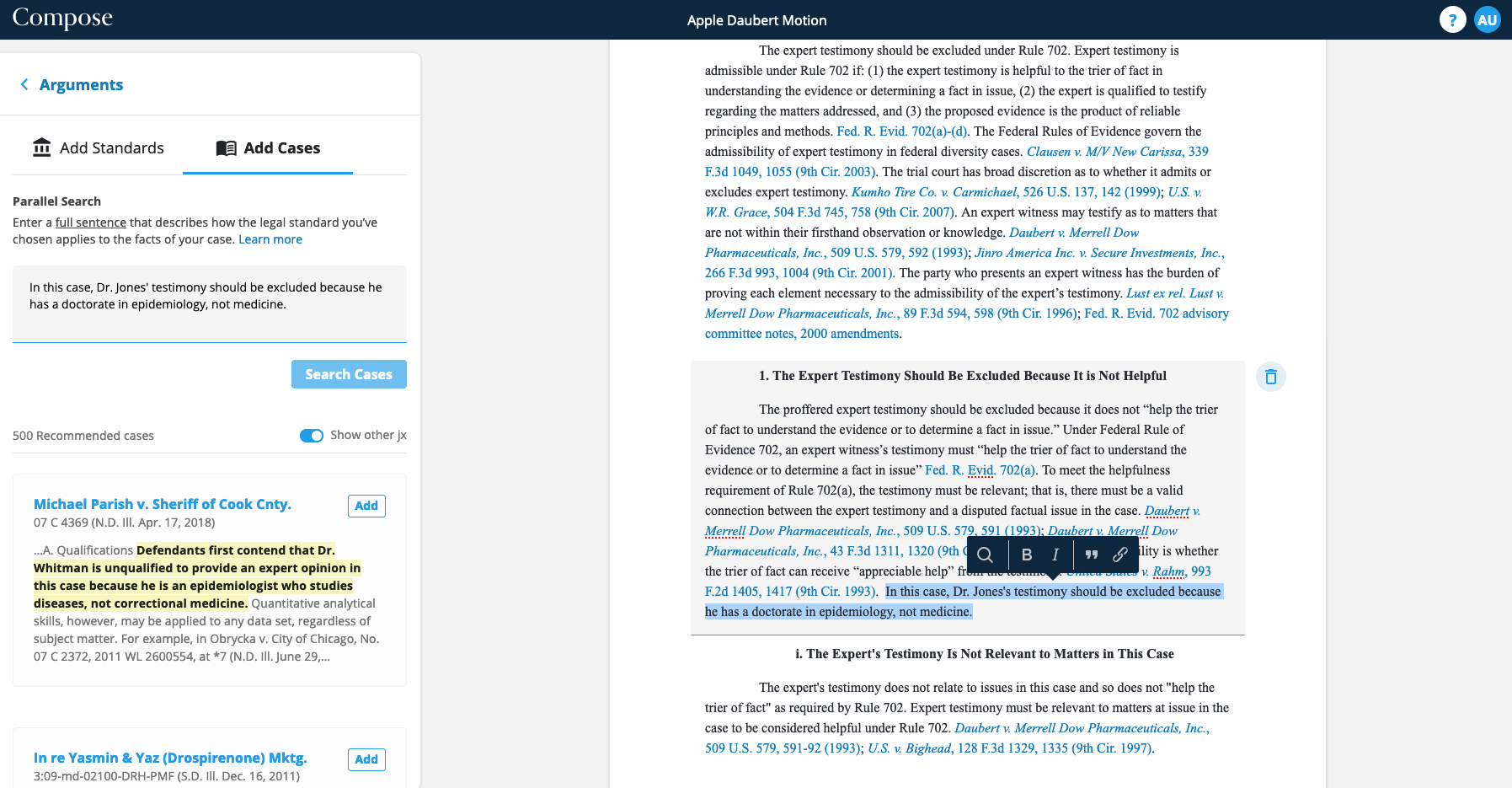
Here is the full press release:
Casetext is Automating Litigation
Casetext’s new litigation automation technology, Compose, automates substantive legal work — and a substantial number of billable hours
SAN FRANCISCO — Casetext, the legal technology company known for its groundbreaking A.I. legal research platform, today announces a new product that will define litigation automation: Compose. Compose, which automates the first draft of a legal brief, is poised to disrupt the $437 billion[1] legal services industry and fundamentally change our understanding of what types of professional work are uniquely human.
Writing the first draft of a brief is historically a complicated process that often takes 10-80 hours of billable work: searching case law databases, consulting treatises, digging through brief banks, etc. Compose enables an attorney to construct a compelling, well-supported legal argument in 20 minutes. You simply enter basic information about the brief you want to draft, and Compose provides the available arguments and applicable legal standards, which you can add with a click.
Compose is powered by Parallel Search, a breakthrough new search technology developed by Casetext. Parallel Search, which applies a transformer-based neural language model (the latest technique in NLP), automates the process of finding legal precedent to support the attorney’s argument.
“Traditional search technology matches based on words and synonyms. That only gets you so far in the law, where arguments are based on concepts and analogies,” says Javed Qadrud-Din, Casetext’s Director of Machine Learning and an ex-lawyer. “Parallel Search finds documents that contain matching concepts, even if they don’t use any of the same language.”
Leading law firms – including Ogletree Deakins, Sheppard Mullin, and Bowman and Brooke – are already embracing the technology. They see it as a competitive edge in an industry where clients want to work with firms that will produce high-quality work product efficiently.
“Casetext has clearly examined writing motions as part of an attorney’s work, and they have come up with a groundbreaking new way of automating a good part of that process. I think that is going to make it one of the most important tools in our attorneys’ toolkit,” says Flyn Flesher, Knowledge Management Counsel Supervisor at Ogletree Deakins.
Compose’s automation of motion practice stands to reshape the $437 billion per year spent on legal services in the United States. Fortune 200 companies each spend an average of $140 million per year on legal services. Leveraging Compose will enable them to dramatically cut that spending without compromising on the quality of their representation.
“After automation, what’s left are the most interesting, substantive, strategic parts of legal practice, without the drudgery, the expense, and the inefficiency,” says Jake Heller, Casetext CEO and co-founder. “We’re making space for lawyers to make new arguments, pursue new strategies, and experiment with new business models. But what’s maybe most exciting about this, and any truly innovative technology, is that we don’t know exactly what the impacts will be. Automation allows for imagination.”
Attorneys interested in trying Compose can visit compose.law or contact sales@casetext.com for more information.
About Casetext:
Casetext is a legal technology company that automates critical elements of legal practice in order to empower attorneys to provide consistently high-quality and cost-effective representation. CEO Jake Heller left practice as a litigator at Ropes & Gray to found Casetext in 2013. He was soon joined by co-founders (and fellow attorneys) Pablo Arredondo (CPO) and Laura Safdie (COO & GC). In 2016, Casetext released its comprehensive legal research platform — now used by over 5,000 U.S. law firms — which leverages A.I. technology to automate much of legal research. In 2020, Casetext made the next big leap in litigation automation with Compose: first-of-its-kind technology that automates critical, substantive elements of litigation.
Casetext press contact:
Hannah Doherty
(317) 407-0790
Customers available for interviews:
Ali Shahidi
Chief Innovation & Client Solutions Officer, Sheppard Mullin
213.617.4262
Chris Austin
Director of Information Governance, Bowman and Brooke
612.656.4031
Chris.Austin@bowmanandbrooke.com
Vincent Galvin
Executive Managing Partner, Bowman and Brooke
408.961.4501
vincent.galvin@bowmanandbrooke.com
Flyn Flesher
Knowledge Management Counsel Supervisor, Ogletree Deakins
832.607.0179
Flyn.Flesher@ogletreedeakins.com
Ryan King
Director of Communications, Ogletree Deakins
404.870.1742
[1]http://www.legalexecutiveinstitute.com/wp-content/uploads/2016/01/How-Big-is-the-US-Legal-Services-Market.pdf


